|
Pivotal World Series Plays
Willie's Catch and Dusty's Homer
Game One, 1954 World Series:
The Cleveland Indians and New York Giants are tied at two going into the top of the 8th inning at the Polo Grounds.
Giants starter Sal Maglie walks CF Larry Doby - Sal's first free pass of the game. Then 3B Al Rosen smacks a sharp grounder just past SS Alvin Dark to move Doby to second. The next batter is 1B Vic Wertz. The Giants and Indians trained in Arizona each spring. So they have good reads on each other's hitters. However, Wertz began the season with the Orioles before being traded to Cleveland June 1. So the Giants have no "book" on him. He is three-for-three against Maglie - two singles and a triple. There is no way NY manager Leo Durocher will let his tired starter face Wertz again. So The Lip sends pitching coach Freddie Fitzsimmons to the mound to summon lefty Don Liddle, whose best pitch is his curveball. Knowing that, CF Willie Mays cheats in some because hitters tend to pound Liddle's curve into the ground, and Willie wants to cut down the runner at the plate on a single. He is also shading Wertz a bit to the right and expecting him to swing at the first pitch as most hitters do when a reliever enters a game. Wertz does swing at Liddle's first delivery but misses. After taking a ball, Wertz is given the bunt sign but fouls off the pitch. With the count 1-2, and Vic expects a high, tight fastball because that's what most lefties throw him with that count to drive him off the plate to set up the curveball on the next pitch. Liddle indeed throws a fastball but not far enough in. The ball stays over the plate almost at shoulder level. The 185lb slugger extends his thick arms, rotates his wrists, and hits the ball on the nose. Seeing the ball soaring toward deep CF, Wertz begins pumping his stubby legs to get a sure double or maybe another triple. SS Dark instinctively spins to his left and looks toward CF. In his eight years in the National League, Mays is the only CF Al has seen who is already going full speed the moment Al peers over his left shoulder. Still, Dark thinks, "Two runs," because Willie has no angle on the ball, which is straight over his head - the toughest catch of all. Doby hesitates and starts back to second to tag up should the ball be caught, figuring he can score easily if it isn't. Rosen, nearing second base, is positive he will score all the way from first. LF Monte Irvin sprints over to prevent an inside-the-park home run if the ball caroms off the wall in his direction. Liddle jogs, head down, to back up third base. The Giants in the dugout stand on the top step. Durocher hopes the ball stays in play because he believes Willie will catch it if it does. The wall Mays is approaching is about 450' from home plate. He doesn't slow down as he nears the warning track, veering slightly to his right, and snags the ball like a wide receiver as it descends over his head less than 10' from the wall. Then he stops on a dime, whirls, and flings the ball on one hop to second base, falling down from the effort. Doby tags up and goes hard to third with the idea of scoring, but Willie's great throw forces 3B coach Tony Cuccinello to stop Larry at third. Meanwhile, Rosen hustles back to first, passing Wertz on the way. Jack Brickhouse, calling the game on NBC-TV, yells, "Willie Mays just brought this crowd to its feet with a catch which must have been an optical illusion to a lot of people. Boy!" 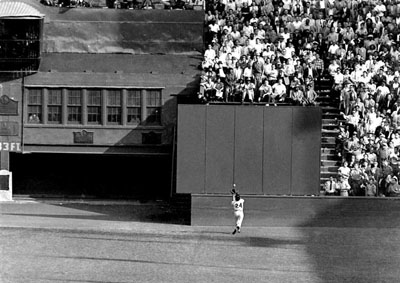 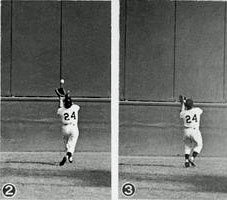 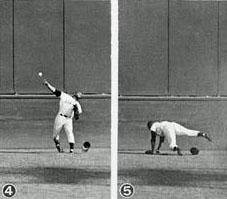 Mays's 8th inning catch and throw. Durocher brings in righthander Marv Grissom. Liddell goes to the dugout, sits down, and says, "Well, I got my man." Mays recalled the catch this way: "Wertz hits it. A solid sound. I learned a lot from the sound of the ball on the bat. Always did. I could tell from the sound whether to come in or go back. This time I'm going back, a long way back, but there is no doubt in my mind. I am going to catch this ball . . . But that wasn't the problem. The problem was Larry Doby on second base. On a deep fly to center field at the Polo Grounds, a runner could score all the way from second. I've done that myself and more than once. So if I make the catch, which I will, and Larry scores from second, they still get the run that puts them ahead. All the time I'm running back, I'm thinking, 'Willie, you've got to get this ball back into the infield.' I have to turn very hard and short and throw the ball from exactly the point I caught it. The momentum goes into my turn and up through my legs and into my throw."
The game stays tied into the bottom of the tenth until another Giant becomes Willie's co-star for the game.Grissom walks pinchhitter Dale Mitchell. But the 36-year-old strikes out PH Dave Pope and gets C Jim Hegan to fly to Irvin to keep Doby at third. In the top of the tenth, Willie makes another great play on Wertz. Leading off, Vic whacks Grissom's pitch on a line into LCF. Irvin has no chance to stop the ball from going to the wall, but Mays races over, scoops the ball, and hurls in one motion to 3B Hank Thompson on the fly a step in front of the bag. Wertz stops at second with a 400' double. He moves to third on a bunt but is stranded there when Grissom strikes out Bill Glynn and gets P Bob Lemon on a liner to first. Cleveland manager Al Lopez let Lemon hit for himself so Bob can pitch the bottom of the tenth. But that proves to be a much-maligned decision. After Don Mueller strikes out, Mays draw a walk. With Thompson at the plate, Willie steals second on the first pitch. So the Indians give Hank an intentional walk. Out comes a lefthanded pinchhitter for Irvin. James "Dusty" Rhodes had his name in the box scores of 82 games for the Giants, hitting .341 with 15 HRs. He played 37 games in LF with the rest of his appearances as a pinch hitter. By his own admission, Dusty was a lousy outfielder. When asked what position he played, he would say, "Me and Willie play left field." Rhodes swings at Lemon's first pitch and lofts a fly ball down the right line. 2B Bobby Avila runs for it, but the ball, aided by the wind, drifts towards the wall, which is only 258' from home plate at the foul line. RF Dave Pope jumps in vain as the ball lands in the first row. The home run traveled almost 200' less than Wertz's mighty blow in the eighth inning. Final score: Giants 5 Indians 2 Cleveland never recovers from Game One. Despite being a decided underdog, the Giants sweep the team that won 111 American League games. 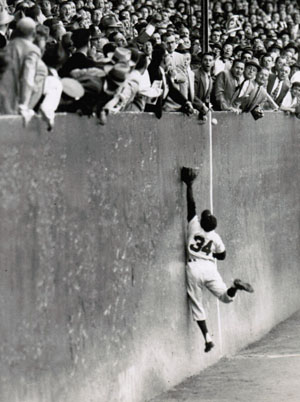 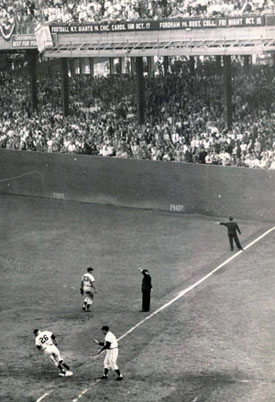 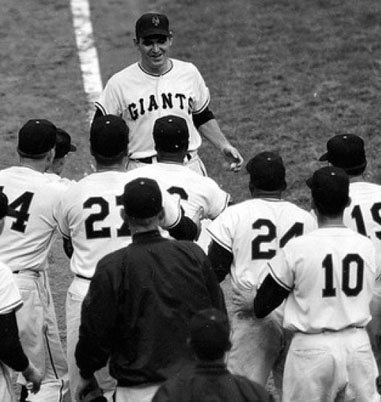 Dave Pope leaps in vain for Rhodes' pop fly homer. The two managers had different takes on The Catch. Asked if it was the greatest catch he'd ever seen, Durocher, a world class jerk, answered, "Willie makes f**king catches like that every day. Do you keep your f**king eyes closed in the press box?" When told of Leo's response, Lopez grew indignant. "I've been playing ball since I was a kid. I've been around the major leagues for thirty years. That was the greatest catch I've ever seen. Just the catch, mind you. Now put it all together. The catch. The throw. The pressure on the kid. I'd say that was the best play anybody ever made in baseball." Lopez compared Wertz's clout to Rhodes' game-winner: "It was the longest out and the shortest homer of the year." Joe DiMaggio, watching from the press box, emphasized Willie's courage in refusing to slow down until he caught the ball just a few feet from the wall. He called the catch "greater than Al Gionfriddo's in the 1947 Series." Another interesting fact from Game One: The catcher for the Indians in the bottom of the 10th was Mickey Grasso. He was inserted after Lopez lifted the weak-hitting starter starter Jim Hegan for a pinch hitter in the top of the inning. Grasso had served in the Army in World War II and fought in North Africa. He was taken prisoner and spent several years in a prison camp in Germany. Mickey was severely beaten several times after failed escape attempts. Finally, he escaped as the Russian army was closing in on the camp. He recovered from a 60-pound weight loss and resumed his baseball career in the Giants organization. He was traded to Cleveland prior to the '54 season but broke his ankle and appeared in only four games that season. But he made the World Series roster and became the only former prisoner of war to appear in a World Series game.
References: Willie Mays: The Life, the Legend, James S. Hirsch authorized by Willie Mays (2010)Baseball's Untold History: The World Series, Michael Lynch (2016) |